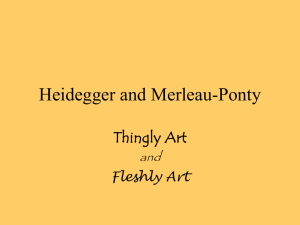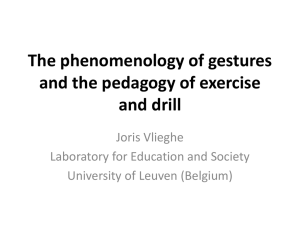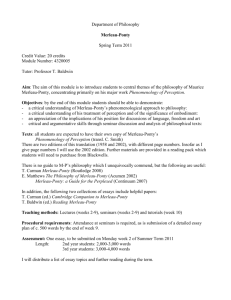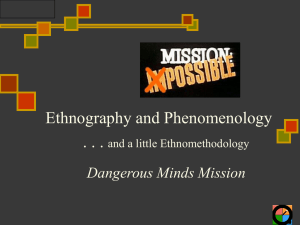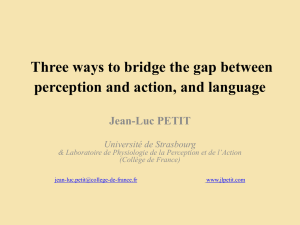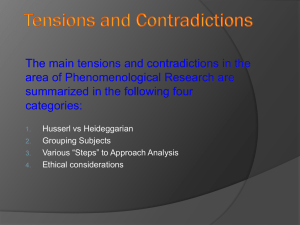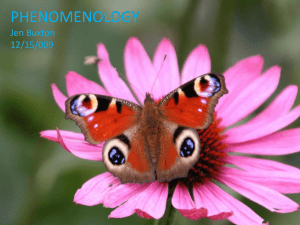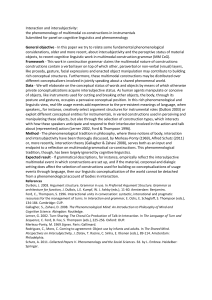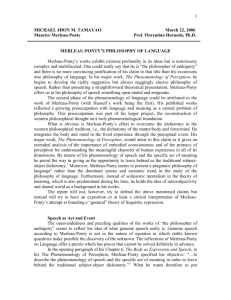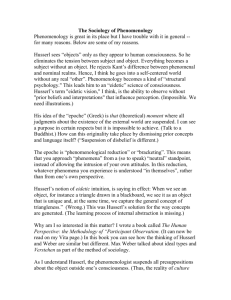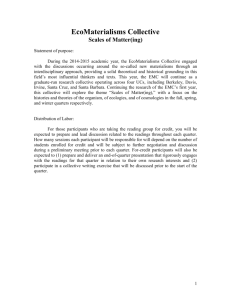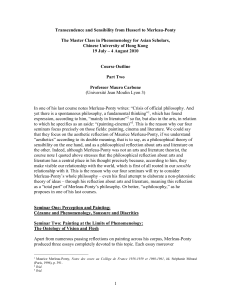(Springer, 1992). - University of Kent
advertisement
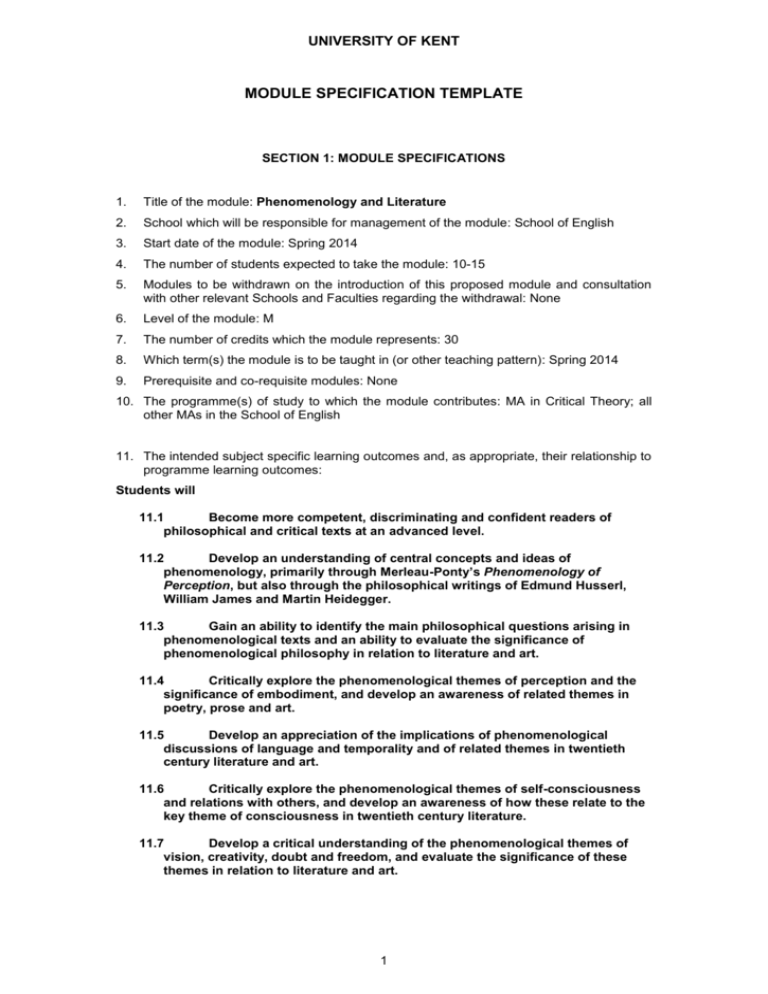
UNIVERSITY OF KENT MODULE SPECIFICATION TEMPLATE SECTION 1: MODULE SPECIFICATIONS 1. Title of the module: Phenomenology and Literature 2. School which will be responsible for management of the module: School of English 3. Start date of the module: Spring 2014 4. The number of students expected to take the module: 10-15 5. Modules to be withdrawn on the introduction of this proposed module and consultation with other relevant Schools and Faculties regarding the withdrawal: None 6. Level of the module: M 7. The number of credits which the module represents: 30 8. Which term(s) the module is to be taught in (or other teaching pattern): Spring 2014 9. Prerequisite and co-requisite modules: None 10. The programme(s) of study to which the module contributes: MA in Critical Theory; all other MAs in the School of English 11. The intended subject specific learning outcomes and, as appropriate, their relationship to programme learning outcomes: Students will 11.1 Become more competent, discriminating and confident readers of philosophical and critical texts at an advanced level. 11.2 Develop an understanding of central concepts and ideas of phenomenology, primarily through Merleau-Ponty’s Phenomenology of Perception, but also through the philosophical writings of Edmund Husserl, William James and Martin Heidegger. 11.3 Gain an ability to identify the main philosophical questions arising in phenomenological texts and an ability to evaluate the significance of phenomenological philosophy in relation to literature and art. 11.4 Critically explore the phenomenological themes of perception and the significance of embodiment, and develop an awareness of related themes in poetry, prose and art. 11.5 Develop an appreciation of the implications of phenomenological discussions of language and temporality and of related themes in twentieth century literature and art. 11.6 Critically explore the phenomenological themes of self-consciousness and relations with others, and develop an awareness of how these relate to the key theme of consciousness in twentieth century literature. 11.7 Develop a critical understanding of the phenomenological themes of vision, creativity, doubt and freedom, and evaluate the significance of these themes in relation to literature and art. 1 UNIVERSITY OF KENT 11.8 Gain a more precise sense of problems of reading and interpretation arising out of in-depth study of philosophical texts. This outcome relates to the knowledge and understanding mentioned in Section A and the subject-specific skills in section C of the MA in Critical Theory Programme Specification. Under section A the specific knowledge and understanding would be of i) modern literary and critical theory; ii) relations between literary and critical theory and particular literary texts, genres and movements; iii) relations between literary and critical theory and philosophy; iv) relations between literary and critical theory and other relevant areas of culture and experience. Under C the subject specific skills would be: i) advanced skills in the close critical analysis and discussion of theoretical, literary and other writing; iii) ability to articulate knowledge and understanding of texts, concepts and theories relating to critical theory; iv) well-developed linguistic resourcefulness including a grasp of standard critical terminology; v) articulate responsiveness to critical and theoretical language; vii) a nuanced understanding of how norms and assumptions influence questions of judgement. 11.9 Develop stronger awareness of how phenomenological texts relate to one another and to literary texts and visual art. This outcome is especially related to the knowledge skills mentioned in Section A and detailed in the paragraph above and the intellectual skills in Section B of the MA in Critical Theory Programme Specification, namely i) Application of the skills needed for academic study and enquiry at graduate level; iii) Ability to synthesise information from a range of primary and secondary sources in order to gain a coherent understanding of theory and practice; and v) Ability to think conceptually and to criticise analytically. 12. The intended generic learning outcomes and, as appropriate, their relationship to programme learning outcomes: 12.1 An ability to read and analyse phenomenological texts critically and make comparisons across a range of reading and visual art. 12.2 Critical and argumentative skills through short presentations and seminar discussion. 12.3 An ability to conduct interdisciplinary research, linking central philosophical themes with poetry, prose and art. 12.4 Skills to carry out independent research 12.5 An ability to critically evaluate and creatively deploy key philosophical perspectives of the twentieth century. 12.6 An ability to construct original, innovative and complex arguments both in class discussions and in writing. 13. A synopsis of the curriculum: This module will introduce students to the philosophical writings of some of the greatest twentieth century phenomenologists, concentrating primarily on Maurice Merleau-Ponty’s phenomenology, but also examining key philosophical concepts in the writings of Edmund Husserl, William James and Martin Heidegger. Whereas the course will focus primarily on the philosophical material, students will also be given the opportunity to explore connections between phenomenology and literature and to ask critical questions about phenomenology in literature. Consideration is also given to related movements in the visual arts. 2 UNIVERSITY OF KENT Setting out to redefine experience, phenomenology rejects the traditional and simplistic ‘interior-exterior’ dualism or split between mind and body that informs both empiricism and Cartesian rationalism. In Merleau-Ponty’s phenomenology, the artist's body gains an unprecedented status in artistic creation: it is the painter’s or writer’s bodily encounter with the world that is expressed onto the blank space of his canvas or page. The creative act emerges out of the world, from a receptive and active interaction with it. In order to put the ideas of Merleau-Ponty and the related thought of James, Husserl and Heidegger into practice, each week we will explore phenomenological aspects of a poet, prose writer or artist selected by the convenor or by the students themselves. Among the writers and artists whose work we will discuss are Wallace Stevens, Mary Oliver, Yves Bonnefoy, Paul Celan, Marcel Proust, Virginia Woolf, James Joyce, Paul Cézanne and Pablo Picasso. 14. Indicative Reading List: Core text: Maurice Merleau-Ponty, Phenomenology of Perception, trans. Colin Smith (Routledge, 1996). All students are expected to have their own copy of Merleau-Ponty’s Phenomenology of Perception. Supplementary materials will either be provided on Moodle or can be accessed via the Templeman library journal database. Supplementary Articles and Essays: Thomas Baldwin, ‘Speaking and Spoken Speech’, in Reading Merleau-Ponty: On Phenomenology of Perception (Routledge, 2007). Mark Kingwell, ‘Husserl’s Sense of Wonder,’ The Philosophical Forum 31, no. 1 (Spring 2000): 85-107. Prendeville, Brendan. “Merleau-Ponty, Realism and Painting: Psychophysical Space and the Space of Exchange.” Art History 22.3 (September 1999): 364-88. Maurice Merleau-Ponty, ‘Cézanne’s Doubt’ in Sense and Non-Sense (Northwestern University Press, 1964). Maurice Merleau-Ponty, ‘Eye and Mind’ in The Primacy of Perception (Northwestern University Press, 1968). Supplementary excerpts from: Martin Heidegger, On the Way to Language (Harper & Row, 2003) Martin Heidegger, Poetry, Language, Thought (Harper Perennial, 2001) Edmund Husserl, Ideas: General Introduction to Pure Phenomenologyi (London: George Allen & Unwin Ltd., 1931). Edmund Husserl, On the phenomenology of the Consciousness of Internal Time (Springer, 1992). Edmund Husserl, Shorter Works (University of Notre Dame Press, 1981). William James, The Principles of Psychology (Encyclopedia Britannica, 1952). Maurice Merleau-Ponty, The Visible and the Invisible (Northwestern University Press, 1968) 3 UNIVERSITY OF KENT Maurice Merleau-Ponty, The World of Perception (Routledge, 2008) Indicative Seminar Plan The seminar discussion will gravitate around chapters in Merleau-Ponty’s Phenomenology of Perception and draw upon supplementary material available on Moodle. When the reading is heavy and difficult, we will spend two weeks on the same texts. Week 1) Wonder: Phenomenology as ‘First’ Philsosophy Maurice Merleau-Ponty, Phenomenology of Perception, Preface. Excerpts from Edmund Husserl’s Ideas. Mark Kingwell, ‘Husserl’s Sense of Wonder,’ The Philosophical Forum 31, no. 1 (Spring 2000): 85-107. Poetry: Wallace Stevens Week 2) The Field of Perception Merleau-Ponty, Phenomenology of Perception, Introduction: chapters 1, 3, 4; Part II, chapter 1. Husserl on the ‘horizon’, William James on the ‘fringe’ of perception Poetry: Yves Bonnefoy Week 3) The Body and ‘Wild Meaning’ Merleau-Ponty, Phenomenology of Perception, Part I: Preface and chapters 1, 3. Husserl on Fact and Essence. Poetry: Mary Oliver. Students should also bring their own examples from poetry, prose or art. Week 4) Language and Phenomenology Merleau-Ponty, Phenomenology of Perception, Part I: chapter 6. Excerpts from Merleau-Ponty, The Visible and the Invisible and Martin Heidegger, On the Way to Language. Thomas Baldwin, ‘Speaking and Spoken Speech,’ in Reading Merleau-Ponty: On Phenomenology of Perception (Routledge, 2007). Poetry: Paul Celan. Week 5) The Art of Doubting Merleau-Ponty, ‘Cézanne's Doubt,’ in Sense and Non-Sense. Brendan Prendeville, “Merleau-Ponty, Realism and Painting: Psychophysical Space and the Space of Exchange.” Art History 22.3 (September 1999): 364-88. Paintings: Paul Cézanne's Monte-Saint Victoire series, his apples and people. Prose: Woolf's Lily Briscoe as paradigm case (short excerpt from To the Lighthouse). READING WEEK Week 7) Self, Other and Intertwining I Merleau-Ponty, Phenomenology of Perception, Part II: chapter 4. Merleau-Ponty, ‘The Intertwining – The Chiasm,’ in The Visible and the Invisible. Painting: Paul Cézanne’s The Large Bathers. Prose: Proust, excerpt from Swann’s Way; Woolf, excerpt from The Waves. Week 8) Self, Other and Intertwining II Same texts as week 7. Students should also bring their own examples from poetry, prose or art. Week 9) On Temporality Phenomenology of Perception Part III chapters 2 and 3. Husserl, excerpts from On the phenomenology of the Consciousness of Internal Time. Prose: Joyce’s Molly Bloom (excerpt from ‘Penelope’ in Ulysses). 4 UNIVERSITY OF KENT Week 10) Seeing Things Maurice Merleau-Ponty, ‘Eye and Mind’, in The Primacy of Perception. Excerpts from Maurice Merleau-Ponty, The Visible and the Invisible. Students to bring their own examples from poetry, prose or art. Revisiting some key concepts. Week 11) Wrapping up the course Final student presentations, tying up loose ends and closing discussion. Additional Recommended Guides or Collections: Baldwin, Thomas, ed. Reading Merleau-Ponty. Routledge, 2007. Bourne-Taylor, Carole and Ariane Mildenberg, Phenomenology, Modernism and Beyond. Peter Lang, 2010 Carman, Taylor. Merleau-Ponty. Routledge, 2008. Carman, Taylor and Mark B. N. Hansen, Cambridge Companion to Merleau-Ponty. Cambridge University Press, 2004. Crowell, Steven. Husserl, Heidegger and the Space of Meaning. Northwestern University Press, 2001. Evans, Fred and Leonard Lawlor, Chiasms: Merleau-Ponty’s Notion of Flesh. State University of New York Press, 2000. Johnson, Galen A., ed. The Merleau-Ponty Aesthetics Reader: Philosophy and Painting. Northwestern University Press, 1993. Kockelmans, Joseph J. Edmund Husserl’s Phenomenology. Purdue University Press, 1994. Kockelmans, Joseph J. On Heidegger and Language. Northwestern University Press, 1980. Matthews, Eric. Merleau-Ponty: a Guide for the Perplexed. Continuum, 2007. Matthews, Eric. The Philosophy of Merleau-Ponty. Acumen, 2002. Natanson, Maurice. Edmund Husserl: Philosopher of Infinite Tasks. Northwestern University Press, 1973. Natanson, Maurice. The Erotic Bird: Phenomenology in Literature. Princeton University Press, 1998. Wilshire, Bruce. William James and Phenomenology: A Study of The Principles of Psychology. Indiana Universit Press, 1968. Zahavi, Dan. Husserl’s Phenomenology. Stanford University Press, 2003. 15. Learning and Teaching Methods, including the nature and number of contact hours and the total study hours which will be expected of students, and how these relate to achievement of the intended learning outcomes: 10 weekly seminars to function as a two-hour guided discussion gravitating around one or two key philosophical concepts. Each seminar will incorporate student presentations introducing a particular passage and linking the issues raised by the passage to that week’s poetry, prose or art (all in accord with outcomes 11.1-11.9). There will be at least 18 hours of personal study per week 5 UNIVERSITY OF KENT 16. Assessment methods and how these relate to testing achievement of the intended learning outcomes: Students will be assessed on a single piece of written work up to 5-6,000 words presented at the conclusion of the module on a topic agreed with the seminar leader, normally focusing on one or two key philosophical issues addressed on the module and on the development of the student's own reading methods and strategies. In preparation for this, students will be invited to discuss their proposals with the seminar leader, who will advise them on appropriate specific reading. This procedure is designed to testing achievement of the module’s three specific learning outcomes and to generic programme outcomes (11.1-11.9 and 12.1-12.6) 17. Implications for learning resources, including staff, library, IT and space: No implications for library, IT and space. Staff with a knowledge of and interest in twentieth century philosophy and literature can teach the course. 18. The School recognises and has embedded the expectations of current disability equality legislation, and supports students with a declared disability or special educational need in its teaching. Within this module we will make reasonable adjustments wherever necessary, including additional or substitute materials, teaching modes or assessment methods for students who have declared and discussed their learning support needs. Arrangements for students with declared disabilities will be made on an individual basis, in consultation with the University’s disability/dyslexia support service, and specialist support will be provided where needed. 19. Campus(es) where module will be delivered : Canterbury If the module is part of a programme in a Partner College or Validated Institution, please complete the following: 20. Partner College/Validated Institution 21. University School (for cognate programmes) or Faculty (for non-cognate programmes) responsible for the programme SECTION 2: MODULE IS PART OF A PROGRAMME OF STUDY IN A UNIVERSITY SCHOOL Statement by the School Director of Learning and Teaching/School Director of Graduate Studies (as appropriate): "I confirm I have been consulted on the above module proposal and have given advice on the correct procedures and required content of module proposals" ................................................................ .............................................. Director of Learning and Teaching/Director of Graduate Studies (delete as applicable) Date ………………………………………………… 6 UNIVERSITY OF KENT Print Name Statement by the Head of School: "I confirm that the School has approved the introduction of the module and, where the module is proposed by School staff, will be responsible for its resourcing" ................................................................. .............................................. Head of School Date ……………………………………………………. Print Name SECTION 3: MODULE IS PART OF A PROGRAMME IN A PARTNER COLLEGE OR VALIDATED INSTITUTION (Where the module is proposed by a Partner College/Validated Institution) Statement by the Nominated Officer of the College/Validated Institution (delete as applicable): "I confirm that the College/Validated Institution (delete as applicable) has approved the introduction of the module and will be responsible for its resourcing" ................................................................. Nominated Responsible Officer College/Validated Institution of .............................................. Partner …………………………………………………. Print Name ………………………………………………….. Post …………………………………………. Partner College/Validated Institution Module Specification Template Last updated February 2013 7 Date UNIVERSITY OF KENT 8
